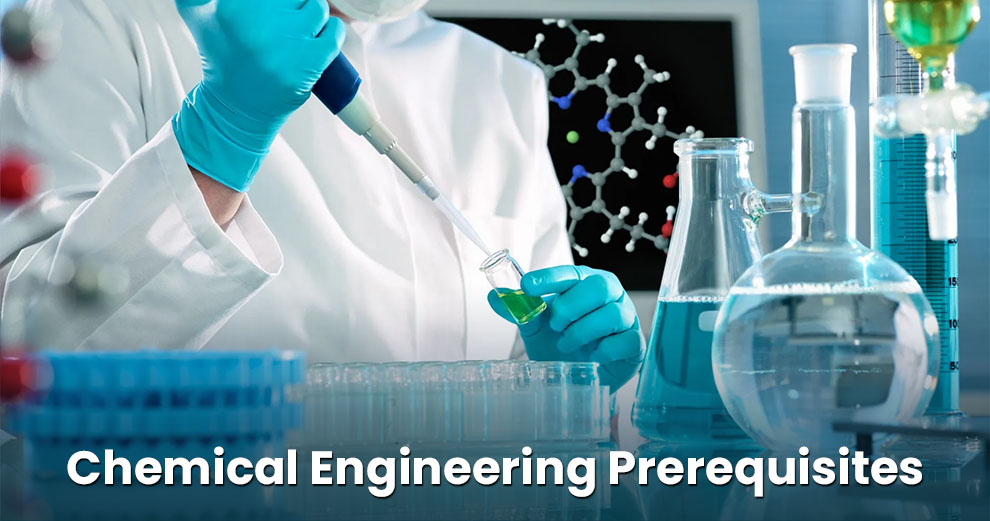Chemical engineering is beyond just chemistry. It is an amalgamation of physics, maths, and even biology. You need a bit of all these subject areas.
Chemical engineering is a stream of study that teaches you the principles and processes necessary to convert chemicals or raw materials into products, like fuel, paint, drinks, clothes, etc.
From the manufacturing of crude oil to producing medicines, chemical engineering finds its application everywhere. But, before you decide to go for a chemical engineering degree, make sure you meet the chemical engineering prerequisites.
Without any prior knowledge of subjects like chemistry, physics, biology, design, and math, it is going to be a tuff road for you.
What Does A Chemical Engineer Do?
Typically, chemical engineers working in manufacturing industries design and develop new processes and upgrade existing methodologies for better products. They have to take care of the resources, guard the environment, and ensure human health and safety while doing their jobs.
Chemical engineers work in pharmaceuticals, construction, manufacturing and many other industries.
What Prerequisite Knowledge Must Aspiring Chemical Engineers Have?
Some chemical engineering subjects comprise fundamentals from chemical reaction engineering, control engineering, biological engineering, nuclear engineering, etc.
So, if you wish to pursue a career as a chemical engineer, you must be well-versed in subjects like physics, chemistry, and math in the application. There are other subject areas and skills too that can help streamline your journey into becoming a successful chemical engineer.
What are the essential requirements? Continue reading to know.
1. Math Knowledge
Fortunately or unfortunately, Chemical engineering is a lot about mathematics. You will encounter integral and differential calculus in every core chemical engineering subject.
Why?
Because chemical engineering refers to the mathematical modeling of chemical and physical processes.
Let us understand this with an example.
You have to dry your clothes. Physically, it is a pretty straightforward process. You put the clothes under the sun, and the sun’s rays will emit heat, evaporating the water retained by the clothes. Hence, drying them. Sounds easy?
When it comes to chemical engineers, they will have to undertake different parameters, such as dry bulb temperature, relative humidity, wet bulb temperature, etc.
You will have to compile them together in a mathematical equation to streamline the process. Now, when it comes to the rate of a process, another one of the quintessential chemical engineering masters prerequisites comes into play – differential calculus.
The same goes for other chemical and physical processes like fermentation, gasification, distillation, etc. As depicted above, one has to account for several parameters while modeling a process, resulting in more complex mathematical expressions.
Chemical engineering is not chemistry equivalent where A+B can give C. Instead, it is a journey from A to C depicted mathematically. Of course, you may not require mathematics when synthesizing a chemical at the lab scale.
However, when the process is brought to a chemical engineer to scale up, all he needs is his mathematics knowledge.
From thermodynamics of the reaction to kinetics, column sizes, or calculation of reaction, energy and material balances, process control, and flow of fluids all involves mathematics. Hence, in our view, math is one of the top prerequisites.
People have a common misunderstanding about chemical engineering that it is about mugging up the synthesis and reactions of chemicals. However, it is not. It involves understanding the math behind chemistry and is not as tough as you think.
2. Knowledge of basic engineering science
Science skills involve experimenting, classifying, measuring, inferring, observing, communicating, and predicting. Thus, chemical engineers must have the requisite knowledge and preparedness to carry out these procedures.
3. Knowledge of Chemistry
Chemical engineering is a diverse field. With the knowledge of chemistry, chemical engineers tend to identify the composition of a substance. Further, they use the substance’s properties to turn it into something valuable and meaningful.
So, some chemical engineers who work in research environments or labs depend heavily on chemistry knowledge.
From a practical perspective, not all chemical engineering students will need advanced chemistry. However, some themes in chemistry are vital for chemical engineers as they will recur repeatedly. These include:
- Fundamentals in petrochemicals or organic chemistry
- Fundamental for distillation or Vapor Pressures
- Fundamental for understanding catalyst systems/reactor design or reaction mechanics
Hence, while some engineers depend massively on chemistry, others might not need it too much. But that does not mean that chemical engineers should not understand chemistry at a deeper level.
For instance, if you wish to learn why reaction yield is reducing in a process, you must think of fundamental concepts, such as endothermic/exothermic temperature requirements and reaction sites.
Hence, even though your job centers on offering a solution (typically revamp-oriented or equipment), you must possess an ability to comprehend the chemistry problem to its very essence.
4. Knowledge of Physics
Physics is one of the top masters in chemical engineering prerequisites. There are multiple Physics concepts that you must study to build a solid foundation for chemical engineering. A few of them include:
A. Fluid Mechanics
Fluid mechanics deals with different fluids and their respective behaviors in motion and at rest. It is a common subject between chemical and mechanical engineering.
Mechanical engineers study it in greater depth than chemical engineering. Your fluid mechanics background while studying chemical engineering will help you ascertain how different fluids are going to behave & react under different atmospherics conditions.
B. Mass Transfer
It is a vital chemical engineering pillar studied by Mechanical Engineers, but its application in the chemical industry is massive. The chemical industry lives on various separation processes, all of which use mass transfer applications.
C. Stoichiometry
It is another prerequisite and a primary USP of chemical engineers. Stoichiometry deals with heat and mass balance across the different processes in the Chemical industry. Hence, it is incredibly essential.
D. Thermodynamics
An understanding of thermodynamics helps you while pursuing chemical engineering. Through this subject, you study the interrelationship between heat and physical changes in the state of matter due to chemical reactions.
5. Computer skills
Every industry today employs a computer to simplify and automate the work process. Hence, it is one of the chemical engineering prerequisites. Though it is not at all mandatory.
As a chemical engineer, you will have to employ some computer applications and programs in the course of your work. So, whether you are working on a new design or analyzing data, the right computer skills can help you perform your duties well.
6. Design Skills
You will have to design new processes as well as work with tangible equipment. Thus, design skills are essential for chemical engineers as they help them develop new products in agriculture, energy, chemical, and other related industries.
But design is a broader skill set and demands you to apply your computer, science, and math skills to achieve the necessary workflow.
7. Research Skills
These are pivotal in creating new ideas and understanding things from various perspectives. You will require these skills while improving a concept or developing a new one because your research skills can enable you to troubleshoot the issue encountered during the manufacturing process.
To acquire solid research skills, you must possess a good understanding of the processes and materials involved along with an analytical mind.
8. Resource Management Skills
Such skills help you allocate resources optimally, like material, money, and manpower. It can lower the cost and help deliver the projects timely. You can manage the workload and team more efficiently with your resource management skills.
Is Chemical Engineering Just Studying Chemistry In Greater Detail?
Chemical engineering is beyond just chemistry. It employs physics, economics, math, and chemistry principles to design, produce, and transport metamorphosing materials, energy, and products.
Enroll for a Chemical Engineering Degree – Prestigious Universities and Their Admission Prerequisites
You can become a proficient chemical engineer by enrolling in different Universities. Above we have discussed the general prerequisites for chemical engineering, but, in reality, the requirements may vary between universities.
Below are some of the most renowned Universities that offer Chemical engineering courses. You can click on the annexed link to get a deeper insight into their requirements.
- Columbia University in the City of New York
- The University of Texas at Austin
- The University of Washington
- Berkeley College of Chemistry
Summing up…
So, aspiring chemical engineers need to fulfil their own set of chemical engineering prerequisites. It is advised that you visit the university’s homepage to meet all their admission criteria. If you are choosing an online chemical engineering course, we think you won’t need anything else apart from the subject knowledge and skills we have stated above.





